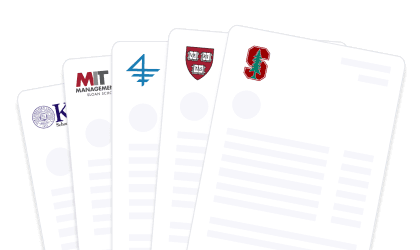
Join a free event
Learn from top coaches and industry experts in live, interactive sessions you can join for free.
Table of Contents
College application essays, which are a key part of college applications, give admissions officers the chance to see who you are beyond your test scores and transcript. Strong college essay topics help students write personal statements that feel honest and reflect the way they think, solve problems, and reflect on past experiences.
In this guide, you’ll find a practical brainstorming worksheet, essay prompts, and real examples of essay topics that worked for other students.
How to Start Brainstorming Your College Essay Topic
What Makes a Strong Essay Topic
A good essay topic focuses on one story or concept and explains why it matters. A strong personal statement shows personal growth, highlights a new understanding, and stays focused on a specific idea. Your essay should not repeat the details of your resume or talk broadly about all your achievements. Instead, focusing on a single meaningful accomplishment can provide depth and insight into your character. The goal is to help the admissions committee feel connected to who you are as a person.
Read: How to End a College Essay (With Examples)
What to Avoid
| Problem | Why It Doesn’t Work |
|---|---|
| Topics that are too broad or vague | These lack focus. Readers won’t know what to take away. |
| Essays that focus too much on another person | If your essay could be about your family member, coach, or friend more than about you, it misses the point. |
| Pure description with no reflection | Telling a story isn’t enough. For example, simply describing a time you struggled in a class without reflecting on what you learned misses the opportunity to show growth. You have to explain what it means and why it matters. |
| Essays that repeat your resume | Listing roles or awards doesn’t teach the admissions committee anything new. |
| Trying too hard to impress | Topics that are performative or engineered to sound smart often feel inauthentic. |
Brainstorming Worksheet: Prompts That Actually Work
Use the prompts below to generate meaningful essay topics. Each one is designed to surface a strong story, challenge, or moment that reveals something specific about you. When answering these prompts, it’s important to respond thoughtfully and provide your best examples to illustrate your points. These aren’t generic “think pieces.” They’re proven, tactical questions based on what admissions officers actually want to see.
| Prompt | Why It’s Effective | How to Use It |
|---|---|---|
| Write about a time you changed your mind | Shows flexibility, growth, and deeper thinking. | Focus on what challenged your original belief and what changed. Respond honestly and reflectively to the question, not just narrate events. |
| Describe a moment when you left your comfort zone | Highlights courage, adaptability, and risk-taking. | Include what was at stake and how you responded. Respond honestly and reflectively to the question, not just narrate events. |
| Talk about something that makes you lose track of time | Reveals genuine interest and intrinsic motivation. | Explain why it matters to you and how it connects to your future. Respond honestly and reflectively to the question, not just narrate events. |
| List three moments that taught you something important | Helps identify patterns and core values. | Look for recurring themes like resilience, leadership, or empathy. Respond honestly and reflectively to the question, not just narrate events. |
| Describe your favorite place and why | Anchors your story in memory, emotion, and meaning. | Focus on what the place represents, not just the location. Discuss why this place fits a particular category that is meaningful to you. Respond honestly and reflectively to the question, not just narrate events. |
| What is the best advice you’ve received? | Provides insight into your decision-making and priorities. | Don’t just quote it, explain how it shaped your actions or outlook. Respond honestly and reflectively to the question, not just narrate events. |
| Write about a challenge you faced and what it taught you | Demonstrates maturity, problem-solving, and accountability. | Choose a moment where you were pushed to grow, not just a generic setback. Respond honestly and reflectively to the question, not just narrate events. |
| Talk about a person who impacted your life | Highlights your capacity for reflection and connection. | Keep the focus on your change, not their biography. Respond honestly and reflectively to the question, not just narrate events. |
Additional Brainstorming Strategy
To strengthen your topic, ask these follow-up questions after each brainstormed idea:
- What does this say about my values?
- How did this experience change how I think or act?
- Would someone reading this learn something meaningful about me?
- Is this the kind of story only I can tell?
- What lessons did I learn from this experience?
- Did this experience inspire my future goals or passions?
- How did this experience shape my hope for the future or my outlook on challenges?
Note: Your personal statement doesn’t need to solve world problems. It needs to give the admissions officers a reason to remember you. The strongest essays do that by staying focused, reflective, and personal.
The 2024–2025 Common App Essay Prompts (And What They’re Really Asking)
Every student applying through the Common App must submit a personal statement, a 250–650-word college application essay that answers one of seven official essay prompts. Hundreds of colleges use the Common App and its following prompts for their applications. The prompts are designed to help the admissions committee understand your values, identity, and perspective, not just your academic record.
While the wording hasn’t changed from last year, the best essays continue to focus on one clear idea: showing how you’ve grown, what you care about, and why it matters. Students should carefully consider which of the following prompts best fits their story.
The Full List of Essay Prompts
| Prompt | What It’s Asking | When to Use It |
|---|---|---|
| 1. Background, Identity, Interest, or Talent | Share something so meaningful about your identity, personal identity, or experiences that your application would feel incomplete without it. | When you want to highlight your culture, upbringing, language, or a passion that shapes how you see the world. |
| 2. A Significant Challenge or Failure | Recount a time you faced difficulty. Focus on what you learned and how you changed. | When you’ve dealt with setbacks, family issues, health struggles, or other real challenges. |
| 3. Questioning a Belief or Idea | Reflect on a time you challenged an assumption, and what came of it. | When you’ve pushed back against expectations, changed your thinking, or stood up for a value. |
| 4. Gratitude in a Surprising Way | Describe something someone did that affected you unexpectedly. Explain how this gratitude affected your motivation or perspective. | When a small moment with a teacher, friend, or mentor shaped your behavior or goals. |
| 5. A Moment of Personal Growth | Talk about a realization or event that helped you better understand yourself or others. | When a specific experience led to emotional maturity, clearer purpose, or new priorities. |
| 6. An Interest That Makes You Lose Track of Time | Describe a topic, concept, or idea that captivates you. Explain why and how you pursue it. | When your passion for learning or creativity reveals who you are beyond school. |
| 7. A Topic of Your Own Design | Share an essay on any topic. It can be one you’ve already written or one that doesn’t match the other prompts. | When you have a well-developed essay that shows strong character and reflection but doesn’t fit 1–6. |
Note: Each prompt allows you to tell a great story. The strongest college essay topics don’t just explain what happened; they show how that experience shaped your thinking, behavior, or future.
How to Match Your Story to the Right Prompt
Start with the story, not the prompt. Identify a moment of personal growth, a challenge, or a meaningful interest that reveals your values. Then choose the prompt that gives you the clearest structure to write about. Once you’ve chosen the right prompt, create an outline or structure that best showcases your story.
Your story may fit more than one prompt. That’s normal. Focus on writing a complete, reflective essay with a clear takeaway. Once that’s in place, you can adjust the framing if needed. Use these three questions to guide your match:
- Does the essay show how I changed or grew?
- Is the focus on my values, not just what I did?
- Does the story help the reader feel connected to who I am?
If the answer is yes, you’re on the right track, no matter which prompt you use.
7 Proven College Essay Ideas That Helped Students Get In
1. A Story About a Time You Made a Mistake
Mistakes show character when paired with accountability and reflection. This type of essay works well when the focus stays on what you learned and how you changed. Answering for your mistake and reflecting on it can demonstrate maturity and personal growth.
Example: You wrote about being dishonest with a close friend. After losing their trust, you worked to rebuild it and learned how important clear communication and honesty are to relationships.
2. A Moment of Personal Growth
This essay shows how you developed maturity, confidence, or perspective. The change doesn’t have to be dramatic; it just needs to be real and meaningful.
Example: After moving to a new city, you had to start over socially. Making new friends without your usual support system helped you become more self-reliant and confident.
3. A Surprising Way Gratitude Affected You
Small moments can leave a lasting impact. This type of essay often begins with an unexpected gesture and ends with a shift in motivation or self-belief.
Example: A teacher complimented your writing during a routine assignment. That small comment helped you see your potential more clearly and led you to start writing for your school newspaper.
4. A Volunteering Experience That Changed You
Writing about service works best when it focuses on what you gained from the experience, not just what you did. Focus on how the experience affected your understanding of others or of yourself.
Example: Volunteering at a senior care center challenged you to listen with more patience. You learned how meaningful small conversations can be and how to connect with people from a different generation.
5. Your Passion for a Concept or Topic
Passion-driven essays reveal your interests and show what makes you curious. These essays work when you explain why the topic matters to you and how it’s shaped your goals or identity.
Example: After becoming fascinated with space science, you began watching rocket launches and reading about astronomy. That interest grew into building small model rockets and considering a future in aerospace engineering.
6. A Challenge You Faced in School or Life
Challenges allow you to demonstrate resilience and adaptability. The key is to avoid writing only about the struggle, focus on how you handled it, and what changed in you as a result.
Example: A sports injury took you off the basketball team during your junior year. That forced pause helped you develop patience, explore new interests, and better support your teammates from a different role.
7. Your Future Plans or Dream Career
This type of essay works when your future goals are connected to something you’ve seen, experienced, or already started working toward. The more specific you are, the more compelling it becomes.
Example: After witnessing unfair treatment of a classmate by a school official, you began researching civil rights law. That experience helped you realize your interest in advocacy and sparked your plan to become a lawyer focused on social justice.
Read: 4 Tips to Elevate Your College Essay
College Essay Ideas by Category
Grouping your college essay topic by category can help you find a meaningful story faster. Below are five common themes that admissions officers often see, each with examples of specific angles that can help you write an original and reflective essay.
| Category | Example Ideas |
|---|---|
| Identity & Family History | Writing about your cultural heritage or religious identity, and how it influences your values or goals. You can also talk about exploring how your family history or immigration experience shaped your understanding of resilience or community or reflecting on what it’s like to speak multiple languages at home and how that affects your sense of self. |
| Interests & Learning | Writing about a scientific discovery, book, or project that sparked your curiosity and changed the way you see the world can provide insight into your personal growth. You could also describe a subject or hobby that makes you lose track of time and how you’ve taken initiative to explore it further. Additionally, sharing how you designed an independent research project or explored a topic outside of school because it genuinely interests you can showcase your passion and drive for learning. |
| Relationships | Reflecting on a moment when a family member taught you something important about responsibility, kindness, or tradition can highlight key life lessons. You could also explore how a friendship challenged your thinking or helped you learn to compromise, apologize, or forgive. You can also try writing about how a mentor or teacher gave you guidance that changed your academic or personal direction can show how influential relationships have shaped your growth. |
| Activities & Hobbies | Describing what you learned about focus, self-expression, or discipline from creating art, music, or code can reveal how these experiences shaped your approach to challenges. You could also write about the effort and learning behind sports, performance, or public speaking, especially when it involved risk or fail. You can also consider connecting a passion project to your future plans and explaining how you’ve taken ownership of your growth outside the classroom can demonstrate your commitment to personal development. |
| Challenges & Change | Telling a story about a significant challenge you faced at home or at school can reveal what it taught you about problem-solving or mindset. You could also write about the impact of moving, changing schools, or other big changes that required you to adapt quickly or reflecting on a personal setback or failure that changed how you approach your goals or relationships can highlight your growth and resilience. |
Note: These categories can help you focus your brainstorming and identify where your most personal and reflective stories might be. The best topics are usually found at the intersection of what happened and why it mattered.
5 Essay Writing Mistakes to Avoid
1. Rewriting Your Resume
The personal statement is not the place to repeat your test scores, GPA, or activities list. Admissions officers already have that information. Instead of summarizing your achievements, tell a story that reveals how you think, what you value, or how you’ve grown.
2. Being Too Generic
Phrases like “I learned a lot” or “It was meaningful” don’t tell the reader anything specific. A strong essay uses clear language and concrete moments. Focus on what actually changed in your mindset, goals, or behavior, and explain that change with examples.
3. Forgetting the Reflection
Describing what happened isn’t enough. The impact of the event is what matters most. Always include a section that answers: How did this experience shape who I am today? Reflection is where growth and maturity come through.
4. Picking a Topic That Doesn’t Add Anything New
If your essay repeats information that’s already in your application, you’re missing an opportunity. Your personal statement should expand the picture, not reinforce it. Choose a topic that adds something new about your identity, goals, or perspective.
5. Ignoring the Prompt
Each Common App prompt is designed to guide your essay toward specific kinds of reflection. Writing a great story that doesn’t actually answer the prompt will hurt your application. After you finish your draft, double-check that your essay clearly responds to the question you selected.
Read: 5 Pro Tips for Writing Successful College Application Essays
How to Use One Essay for Multiple Prompts
Writing multiple college essays can take time. But if your personal statement is built around the right story, you can often adapt it for more than one Common App prompt, or even reuse parts of it for supplemental essays at different schools.
The “Super Essay” Approach
A strong “super essay” focuses on a story that highlights personal growth, identity, or a shift in perspective. These themes appear in most prompts, which makes them easier to repurpose.
To build a super essay:
- Choose a story with clear reflection and change. It should answer questions like: What happened? Why did it matter? What did I learn?
- Make sure the essay reveals something that’s not obvious elsewhere in your college application, such as a value, belief, or long-term goal.
- Focus the body of the essay on what the experience taught you.
- Adjust only the opening and closing sentences to align with the specific prompt or school.
For example, a story about supporting a friend through a hard time could fit:
- Prompt 2 (challenge)
- Prompt 4 (gratitude)
- Prompt 5 (personal growth)
All you need to do is reframe the context slightly in your introduction and conclusion.
Real Student Examples of Essays That Worked
| Title | What It Shows |
|---|---|
| "The Instagram Post" | Shows how a moment of public challenge led to stronger personal beliefs |
| "My Grandma’s Kimchi" | Connects family history to responsibility and legacy |
| "Poop, Animals, and the Environment" | Uses humor and honesty to talk about values and career goals |
| "A Girl Muses on a Dead Bird" | Shows reflection on grief and how it shaped personal growth |
| "I Shot My Brother" | Explores childhood jealousy and emotional development |
Key Takeaways
- Use a specific essay topic that shows growth or a new way of thinking.
- Include personal reflection and tie the experience to your current goals.
- Avoid generic writing and repetition in your college application.
- Use the worksheet to brainstorm ideas based on meaningful experiences.
- Match your story to the Common App prompts that fit best.
Work With a Coach to Find and Perfect Your Essay Topic
The best way to improve your college essay is to get feedback from someone who knows what works. A Leland coach can help you choose your essay topic, organize your ideas, and give clear notes on how to make your writing stronger. Connect with a Leland admissions coach today.
Read these next:
- How to Help Your Child With College Applications (2025-2026)
- How to Start a College Essay: 5 Expert Tips From Admissions Coaches
- 5 Pro Tips for Writing Successful College Application Essays
- 3 Expert Tips for Applying to College
- What Really Matters When Preparing for College
FAQs About College Essay Topics and Brainstorming
What is the best topic for a college essay?
- Focus on a personal story that shows how you’ve grown, learned something important, or developed a clearer sense of who you are; it should offer insight into your thinking, not just recount what happened.
What are the 7 college essay prompts?
- The Common App prompts ask you to write about identity, a challenge you faced, a belief you questioned, an act of gratitude, a moment of personal growth, a topic that excites you, or a subject of your own choice.
What are the 5 D's of college essays?
- The five D’s, death, divorce, disability, disease, and depression, are common topics that should only be used if the focus is on how you responded and what you learned, not just the hardship itself.
What looks good on college essays?
- Strong essays are clear, specific, and reflective; they tell a story that reveals your values, thought process, and how you approach problems or opportunities in real life.
Browse hundreds of expert coaches
Leland coaches have helped thousands of people achieve their goals. A dedicated mentor can make all the difference.


























